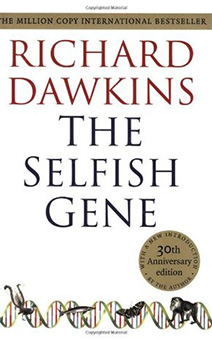
The Selfish Gene is a 1976 book on evolution by the ethologist Richard Dawkins, in which the author builds upon the principal theory of George C. Williams’s Adaptation and Natural Selection (1966). Dawkins uses the term “selfish gene” as a way of expressing the gene-centred view of evolution (as opposed to the views focused on the organism and the group), popularising ideas developed during the 1960s by W. D. Hamilton and others. From the gene-centred view, it follows that the more two individuals are genetically related, the more sense (at the level of the genes) it makes for them to behave cooperatively with each other.
A lineage is expected to evolve to maximise its inclusive fitness—the number of copies of its genes passed on globally (rather than by a particular individual). As a result, populations will tend towards an evolutionarily stable strategy. The book also introduces the term meme for a unit of human cultural evolution analogous to the gene, suggesting that such “selfish” replication may also model human culture, in a different sense. Memetics has become the subject of many studies since the publication of the book. In raising awareness of Hamilton’s ideas, as well as making its own valuable contributions to the field, the book has also stimulated research on human inclusive fitness.
The Selfish Gene
The Selfish Gene is a 1976 book on evolution by the ethologist Richard Dawkins, in which the author builds upon the principal theory of George C. ...
